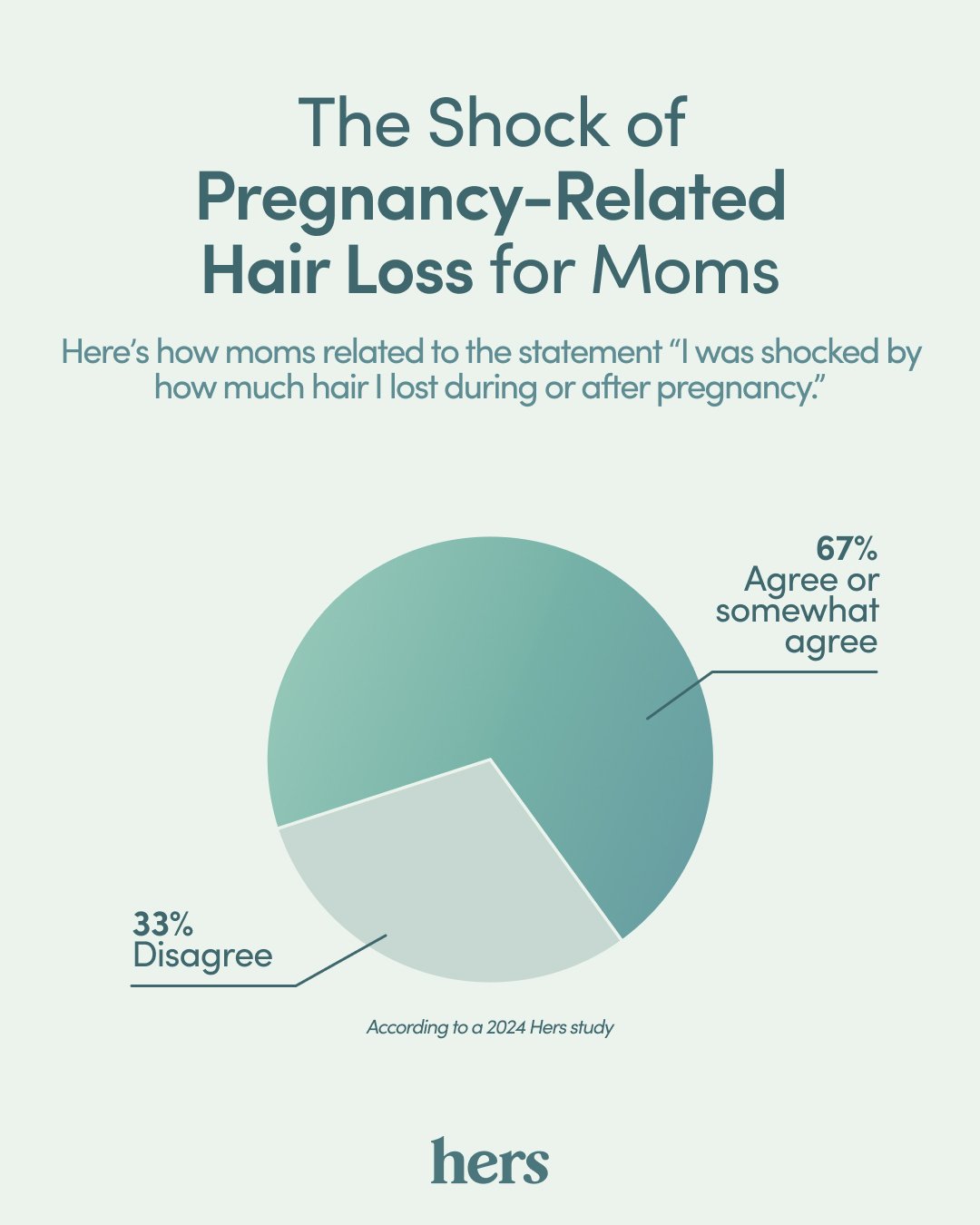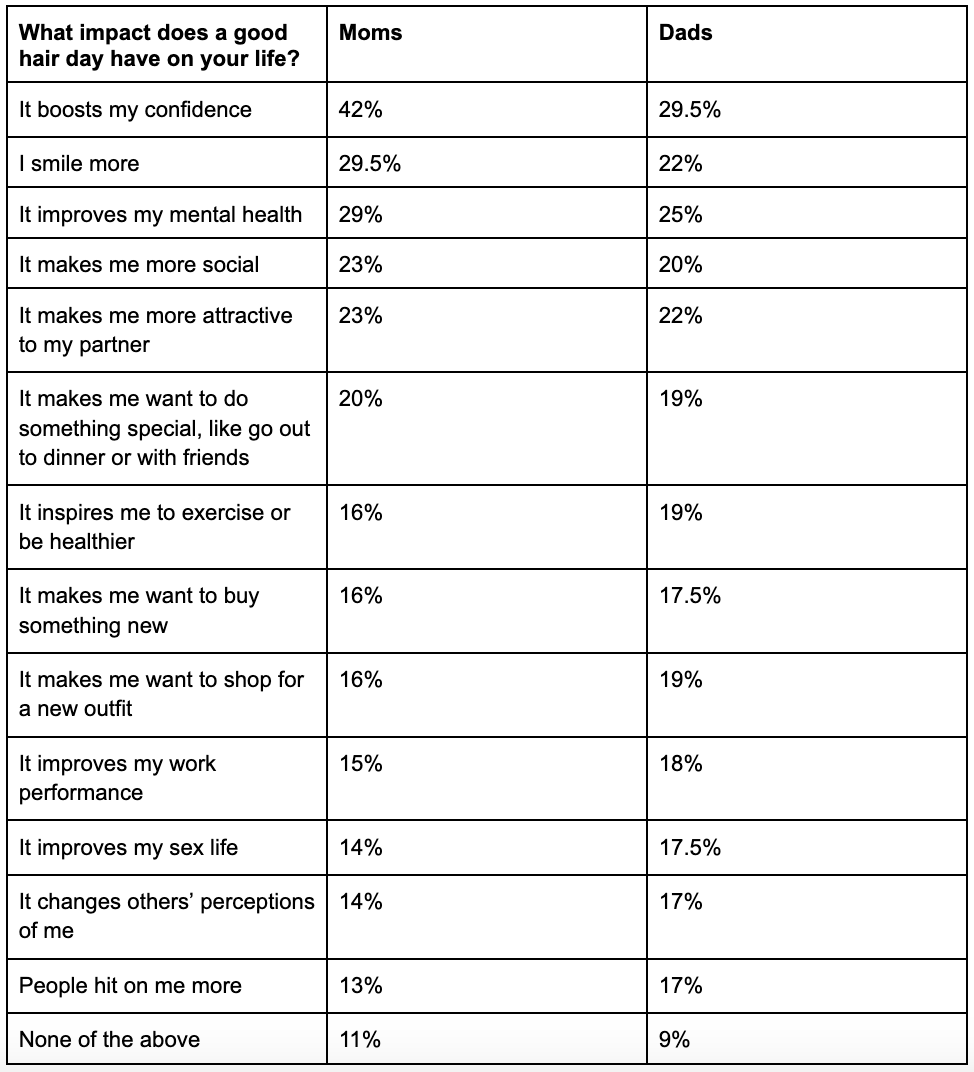Ask any mom about the biggest changes in their life after giving birth and hair loss may not come to mind. But ask moms if they were shocked by how much hair they lost as a result of pregnancy and it’s likely they will answer with a resounding “yes!”
In a study conducted by Hers, two-thirds of mothers (67%) agree or somewhat agree that they were shocked by the amount of hair they lost during or after pregnancy.

Postpartum hair loss explained
Postpartum hair loss is actually quite common. Known as telogen effluvium, it’s a form of temporary hair loss that can occur as a result of things like extreme stress, illness, medication side effects, traumatic events to the body (like surgery or childbirth), and sudden hormonal changes.
What’s happening physiologically has to do with the hair growth cycle. Each hair goes through a growing phase (anagen), transition phase (catagen), and resting phase (telogen) before the hair falls out (exogen) and the cycle starts again.
During and after childbirth, hormonal shifts can cause many hairs to go from the anagen phase to the telogen phase around the same time, and those hairs then fall out a few months later. The good news: postpartum hair loss usually stops about six to 12 months after childbirth.
But those 12 months can have a major impact on a mom’s sense of self.
The quantifiable impact of hair loss for moms
Hair is closely tied to self-esteem, especially for moms. 88% say a good hair day boosts their mood, and 42% feel more confident, compared to just 29.5% of dads.
During postpartum recovery—when 1 in 8 moms experience depression—small mood boosters matter. While not life-changing, good hair helps moms feel more like themselves.
Nearly 9 in 10 moms (89%) say good hair affects daily life, influencing confidence, social interactions, and even how attractive they feel. It can also impact spending habits—20% are more likely to go out, and 16% treat themselves when their hair looks good.
Postpartum hair loss may be temporary, but its effects on confidence are very real.

Women are worried about hair loss, too
New moms may not talk about hair loss due to low awareness—85% believe it’s age-related, though it can happen anytime. Most think hair loss starts around 44 for women, yet the average new mom is just 27.3, making it feel unexpected and stigmatized.
Concerns about hair volume are growing, especially among younger women. 24% of women are unhappy with their hair, compared to 13% of men. Gen Z women are the most proactive—73% have tried hair growth products, far more than Millennials (61%) or Gen X (39%).
Even Gen Z men are becoming more hair-conscious, signaling a shift in how younger generations view hair health.

Does stress cause hair loss?
Many people—and women and moms in particular—believe hair loss is directly related to stress (it can be, but isn’t always). In fact, 62.5% of moms feel this is the case vs. 50.5% of dads, and 57.5% of respondents overall.
This may make moms wonder if it’s their fault that they’re losing their hair. It’s not—in reality most moms experience some hair loss.
Hair loss happens for many reasons, including genetics, age, and overall health. Stress also plays a part. With mental health concerns on the rise, it’s no wonder that parents name stress as the top perceived reason for hair loss, even above genetics and age. Here’s the full picture of what moms vs. dads perceive to be the reasons why we lose our hair.
Tips for dealing with postpartum hair loss
If you’re experiencing postpartum hair loss, you’re not alone. And while excessive shedding from telogen effluvium typically resolves itself in time, there are some things you can do to help in the meantime.
- Consider minoxidil: While there’s no specific treatment for telogen effluvium, minoxidil—a medication that’s approved for female pattern hair loss—can be used off-label for telogen effluvium. Off-label means the medication can be prescribed for a different purpose (like postpartum hair loss) at the discretion of a healthcare provider.
- Keep up with your vitamins: Vitamins and minerals are key for supporting hair health. Continuing to take your prenatal vitamins after birth can supplement a healthy diet to make sure your body has the nutrients it needs for healthy hair. While this won’t impact telogen effluvium, if you are also experiencing hair loss due to a nutrient deficiency, vitamins can be helpful.
- Avoid tight hairstyles: Avoid hairstyles that pull tightly on the hair, such as tight ponytails or braids, and opt for looser styles that reduce tension on the hair follicles. This also won’t help with telogen effluvium specifically, but can be a good tip if you’re experiencing another type of hair loss known as traction alopecia.
- Use the right products: If your hair is feeling thinner than usual, avoid super moisturizing shampoos and products that may weigh down your hair, and instead opt for volumizing shampoo and conditioner for fuller, more voluminous looking hair.
- If hair loss persists, talk to your provider: While postpartum hair loss can be normal, if it doesn’t resolve within a year, consider reaching out to a healthcare professional. It’s possible you might be experiencing other types of hair loss, such as female pattern hair loss (androgenic alopecia). Depending on your specific type of hair loss, there may be treatments available, such as science-backed minoxidil or spironolactone (another medication sometimes used off-label for female pattern hair loss), and a professional can help you figure out if treatment is right for you.
This story was produced by Hers and reviewed and distributed by Stacker.
Follow Metro Parent on Instagram.
from Metro Parent https://ift.tt/ImDeO2V









0 comments:
Post a Comment